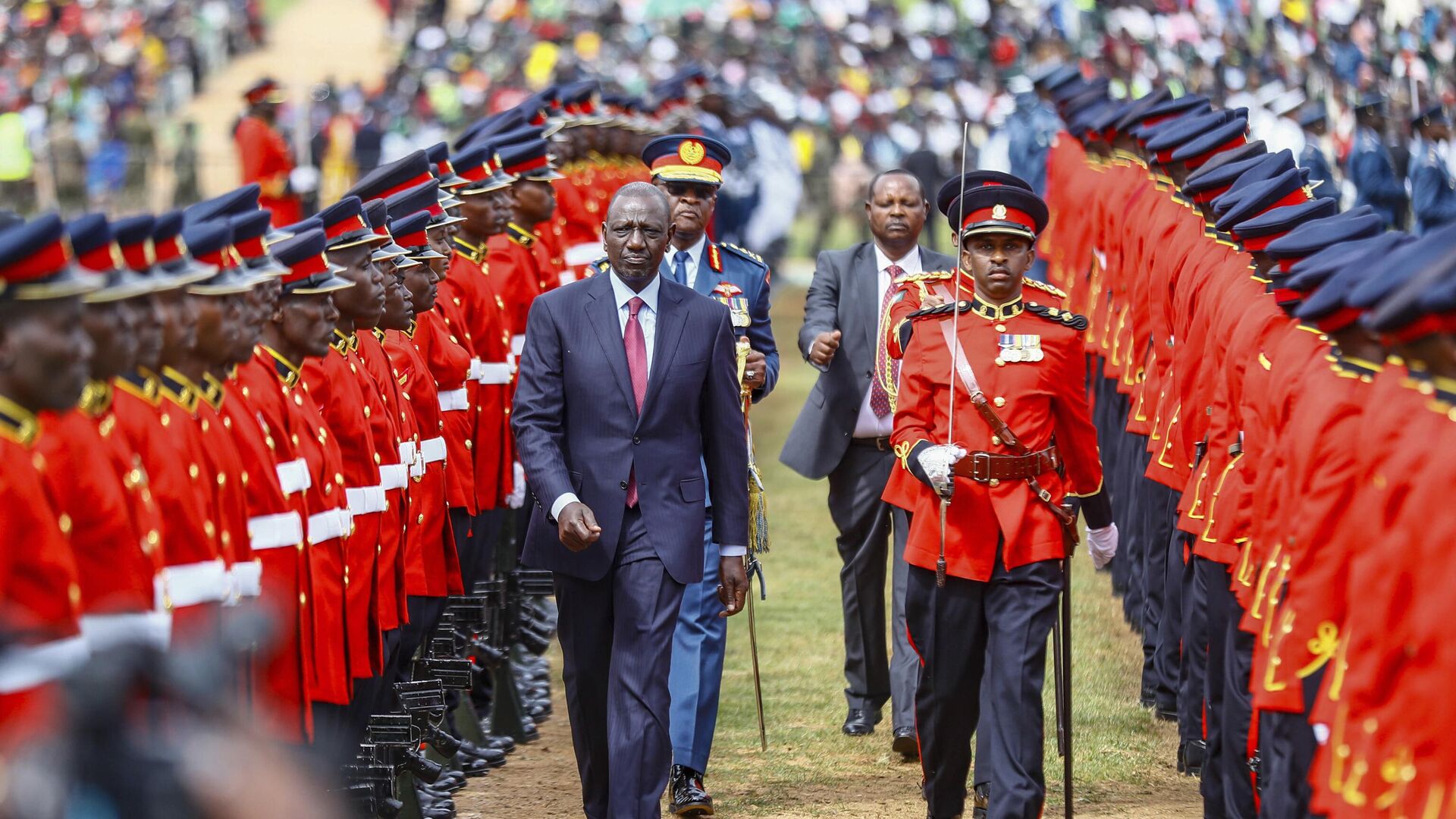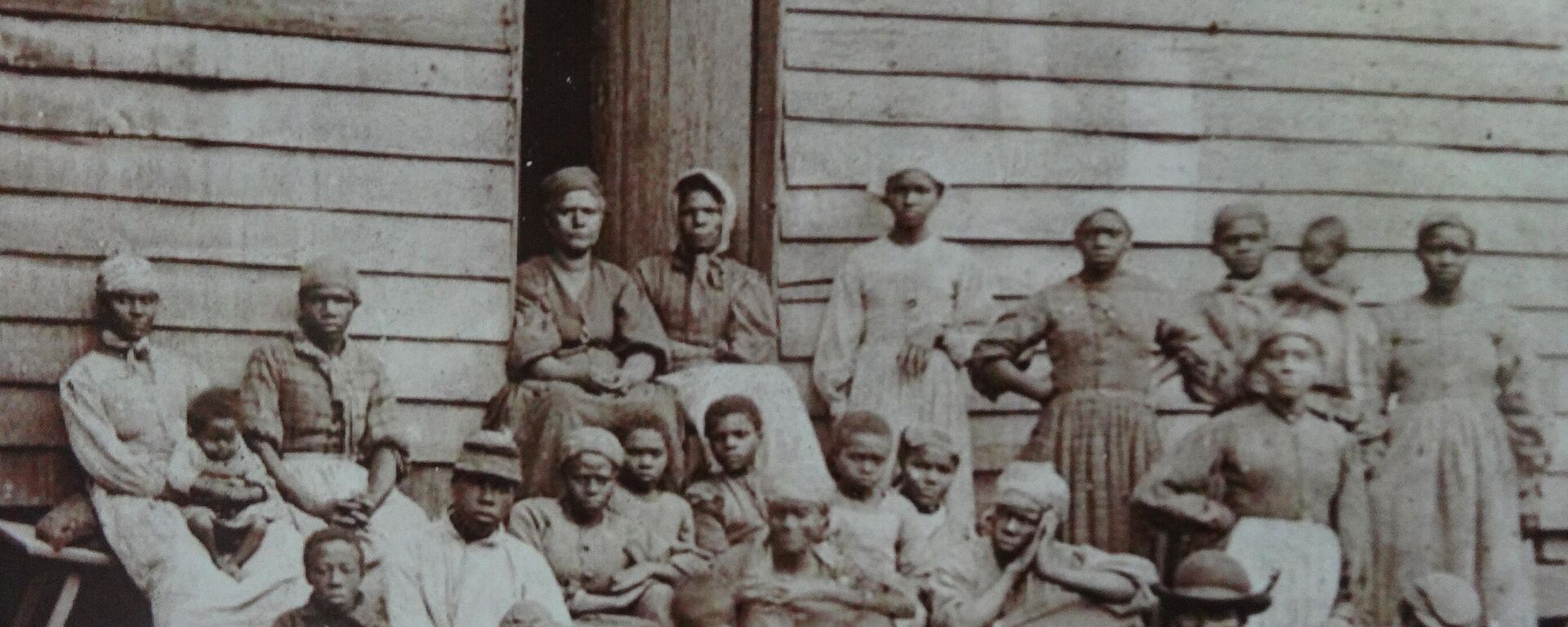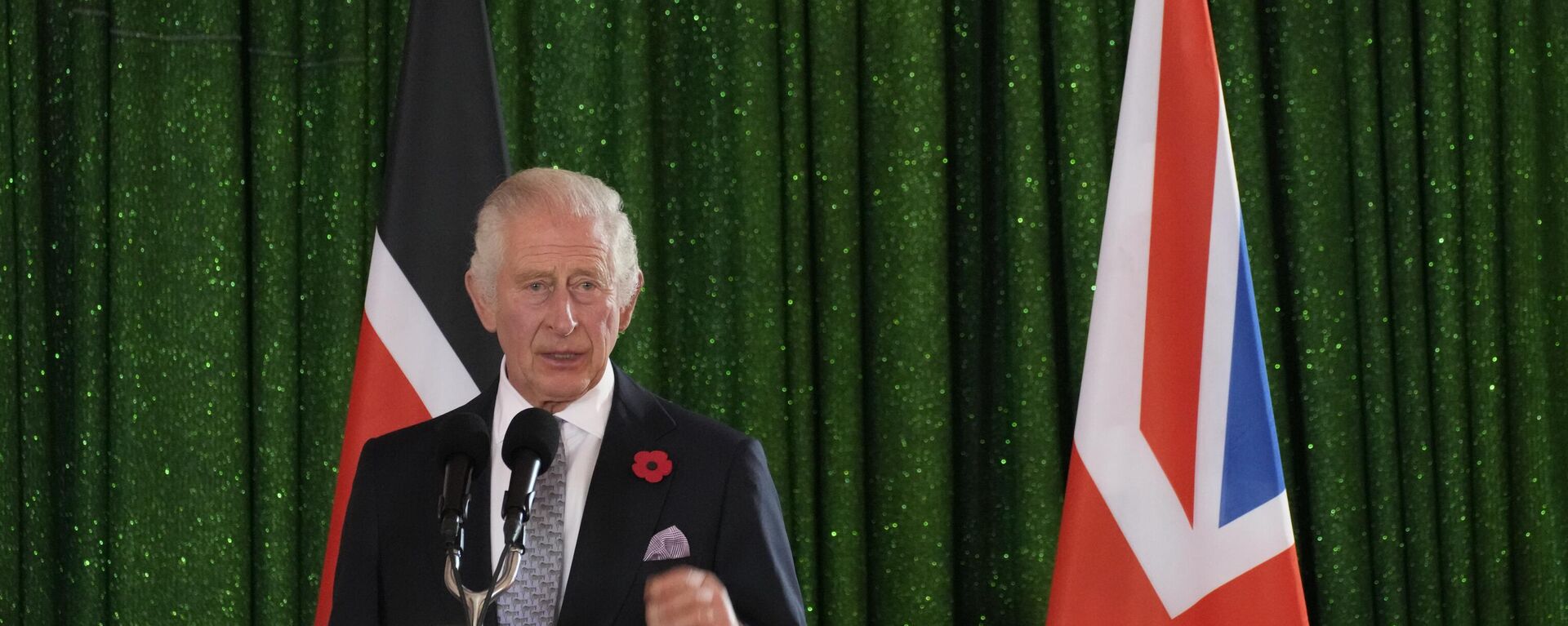https://en.sputniknews.africa/20231212/sacrifices-paid-off-kenya-celebrates-60-years-of-independence-1064085599.html
'Sacrifices Paid Off': Kenya Celebrates 60 Years of Independence
'Sacrifices Paid Off': Kenya Celebrates 60 Years of Independence
Sputnik Africa
December 12, 2023, marks Kenya's 60th anniversary of independence, a historic occasion that celebrates the country's long journey from colonial rule to... 12.12.2023, Sputnik Africa
2023-12-12T17:13+0100
2023-12-12T17:13+0100
2023-12-12T18:14+0100
kenya
britain
colonialism
british colonialism
neocolonialism
independence
anniversary
sub-saharan africa
https://cdn1.img.sputniknews.africa/img/07e7/0c/0c/1064086522_0:0:3072:1728_1920x0_80_0_0_ad5156092eaf9a9844a83c3bd170c776.jpg
Kenya marked its 60th independence anniversary on Tuesday with pomp and color, reflecting on its journey from colonialism to self-governance and development. The main event was held at the Uhuru Gardens in Nairobi, where President William Ruto presided over the celebrations. Parades, cultural performances, speeches, and awards have been held in honor of the anniversary.The event drew the attendance of other heads of state and dignitaries, such as Belarus President Aleksandr Lukashenko and Ethiopian President Sahle Work Zewde. They delivered goodwill messages to Kenya and its people, praising Kenya’s role in regional and global affairs. Particularly highlighted were Kenya's contributions to promoting peace and security, combating terrorism and extremism, and addressing climate change and environmental issues.'Sacrifices Paid Off'The Kenyan leader praised the heroic struggle and sacrifice of the freedom fighters who helped liberate the East African country from colonial oppression and establish the republic status in 1964.Ruto also highlighted the achievements and progress that Kenya made in various fields, including education, health, infrastructure, agriculture, and technology, over the past six decades of freedom.In addition, the president acknowledged the challenges and difficulties that Kenya still faces, such as poverty, inequality, corruption, insecurity, and climate change, urging Kenyans to work together to overcome them.Sorry Not Sorry?In late October and early November, during his first visit to a Commonwealth country since ascending the throne in September last year, King Charles III and his wife Queen Camilla of the United Kingdom, Kenya's former colonizer, paid a four-day state visit to the East African country with the stated aim of strengthening cooperation on economic development, climate change, and security issues.During the visit, the British monarch expressed regret over UK's policy in Kenya during the colonial era, saying that it is necessary to acknowledge "the most painful times" in relations between the two countries. This coincided with calls in Kenya for the UK to return a lot of documents that would shed light on many historical events, including accusations against the British army of committing war crimes in the former colony.Commenting on King Charles' acknowledgement of his country's dark colonial legacy, Professor Munene said that regretting colonial-era atrocities was not enough to "cover up" the crimes committed against Kenyans during their struggle for independence from colonial rule. He suggested that the British monarch's "regret" was driven by "geopolitical reasons".The British seized vast tracts of fertile land throughout the country during nearly seven decades of colonial rule, and thousands of Kenyans were killed, tortured, and imprisoned by British forces during the 1952-60 Mau Mau rebellion.The Kenyan historian also noted that the British used to hide facts and retell the history of former colonies the way the British government wanted. In conclusion, the scholar expressed hope that more Kenyans will understand the "true meaning" of the Independence Day instead of being "distanced from the history".
https://en.sputniknews.africa/20230922/colonizers-must-stop-robbing-africa-and-should-return-the-stolen-experts-argue--1062278576.html
https://en.sputniknews.africa/20231101/uk-king-charles-iii-expresses-regret-over-uks-policy-in-kenya-during-colonial-era-1063242500.html
kenya
britain
Sputnik Africa
feedback@sputniknews.com
+74956456601
MIA „Rossiya Segodnya“
2023
Muhammad Nooh Osman
https://cdn1.img.sputniknews.africa/img/07e7/04/0a/1058467512_0:0:1280:1280_100x100_80_0_0_ec723833bcbfcaed2e21952965ad99e4.jpg
Muhammad Nooh Osman
https://cdn1.img.sputniknews.africa/img/07e7/04/0a/1058467512_0:0:1280:1280_100x100_80_0_0_ec723833bcbfcaed2e21952965ad99e4.jpg
News
en_EN
Sputnik Africa
feedback@sputniknews.com
+74956456601
MIA „Rossiya Segodnya“
Sputnik Africa
feedback@sputniknews.com
+74956456601
MIA „Rossiya Segodnya“
Muhammad Nooh Osman
https://cdn1.img.sputniknews.africa/img/07e7/04/0a/1058467512_0:0:1280:1280_100x100_80_0_0_ec723833bcbfcaed2e21952965ad99e4.jpg
kenya, britain, colonialism, british colonialism, neocolonialism, independence, anniversary
kenya, britain, colonialism, british colonialism, neocolonialism, independence, anniversary
'Sacrifices Paid Off': Kenya Celebrates 60 Years of Independence
17:13 12.12.2023 (Updated: 18:14 12.12.2023) Muhammad Nooh Osman
Writer/Editor
December 12, 2023, marks Kenya's 60th anniversary of independence, a historic occasion that celebrates the country's long journey from colonial rule to freedom. The day is also known as Jamhuri Day, which means "Republic" in Swahili. On the same day, Kenya became a republic in 1964 after gaining independence from Great Britain in 1963.
Kenya marked its 60th independence anniversary on Tuesday with pomp and color, reflecting on its journey from
colonialism to self-governance and development.
The main event was held at the Uhuru Gardens in Nairobi, where President William Ruto presided over the celebrations. Parades, cultural performances, speeches, and awards have been held in honor of the anniversary.
The event drew the attendance of other heads of state and dignitaries, such as Belarus President Aleksandr Lukashenko and Ethiopian President Sahle Work Zewde. They delivered goodwill messages to Kenya and its people, praising Kenya’s role in regional and global affairs. Particularly highlighted were Kenya's contributions to promoting peace and security, combating terrorism and extremism, and addressing climate change and environmental issues.
"I am delighted to have the privilege of leading the people of our nation in celebrating the important milestone in our journey to national independence. Sixty years ago, on a day like this, Kenya took its final step of the freedom struggle to become a sovereign Republic," Kenyan President William Ruto in an address to the nation at the Uhuru Gardens on Tuesday. "This anniversary gives us the opportunity to gather as a family and reflect together on how we have fared over the course of six decades."
The Kenyan leader praised the heroic struggle and sacrifice of the freedom fighters who helped liberate the East African country from colonial oppression and establish the republic status in 1964.
Ruto also highlighted the achievements and progress that Kenya made in various fields, including education, health, infrastructure, agriculture, and technology, over the past six decades of freedom.
In addition, the president acknowledged the challenges and difficulties that Kenya still faces, such as poverty, inequality, corruption, insecurity, and climate change, urging Kenyans to work together to overcome them.
"Though painful, the sacrifices we have made, would not only make our freedom fighters proud but were also absolutely necessary at such a time as we found ourselves in to guarantee our nation’s economic stability. Proudly, these sacrifices have paid off: I can now confirm that Kenya is safely out of the danger of debt distress and that our economy is on a stable footing. The economic indicators point to good news," President Ruto said.
In late October and early November, during his first visit to a Commonwealth country since ascending the throne in September last year, King Charles III and his wife Queen Camilla of the United Kingdom, Kenya's former colonizer, paid a four-day state visit to the East African country with the stated aim of strengthening cooperation on economic development, climate change, and security issues.
During the visit, the British monarch expressed regret over UK's policy in Kenya during the colonial era, saying that it is necessary to acknowledge "the most painful times" in relations between the two countries. This coincided with calls in Kenya for the UK to return a lot of documents that would shed light on many historical events, including accusations
against the British army of committing war crimes in the former colony.
"The visit by Charles III was so carefully choreographed that there hardly was room for raising issues of returning anything. There was no known royal commitment to facilitate the return of documents or anything else," Macharia Munene, Professor of History and International Relations at the US International University in Kenya's Nairobi, told Sputnik Africa.
Commenting on
King Charles' acknowledgement of his country's dark colonial legacy, Professor Munene said that regretting colonial-era atrocities was not enough to "cover up" the crimes committed against Kenyans during their struggle for independence from colonial rule. He suggested that the British monarch's "regret" was driven by "geopolitical reasons".
"[The visit] made Prince Charles happy, but he made no apologies and he did not intend to make any apology. Expressed some regret, yes, but not to apologize. To apologize would imply that the entire colonial enterprise was wrong," Munene told Sputnik Africa.
The British seized vast tracts of fertile land throughout the country during nearly seven decades of colonial rule, and thousands of Kenyans were killed, tortured, and imprisoned by British forces during the 1952-60 Mau Mau rebellion.
"There is some resentment of British overlordship on […] Kenya and lack of reciprocity in the relationship. The general public is generally not concerned mainly because many know little about colonialism," professor Munene said. "There is need for educational overhaul to remove obstacles and to create room for proper history to be taught in schools."
The Kenyan historian also noted that the British used to hide facts and retell the history of former colonies the way the British government wanted.
"The UK supports that kind of mentality and then takes on the role of try to tell Kenyans what their history is. British scholars are usually well funded to say something about Kenyans the way it's supposed to be," he said.
In conclusion, the scholar expressed hope that more Kenyans will understand the "true meaning" of the Independence Day instead of being "distanced from the history".




